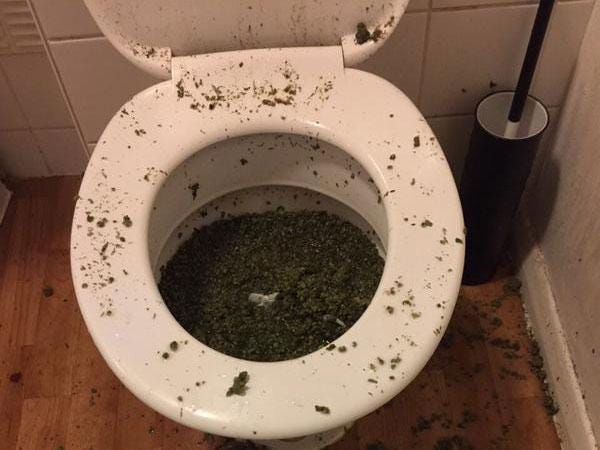dumping oil down the sink. But on the other end... There might be the same but
worse going on in the other pipe. No really!
To me this I see as a UN-American invasion of privacy. Fascist, over paranoid!
I need to note that kids in college chose to go to the college they went to and
they are paying for their education, so for the college they go to acting in a way
that invades their privacy is unheard of! There are issues of having a phone in class
vs the student that is paying for his classes having a right to have a phone in class
as it's the students cost to pay for the class but then also the college's view to protect
the test scores from cheating students using their phone vs the college to
protect it's State / government rating. But to spy on the students is bad!
This also might be going in in your town big or small! Is it more than you want
to know? NO, because it's your ass!
~~~~~Using waste water to flush out drug dealers
When they flush the toilet, most people don’t think about what happens
next. But for several hundred students at a private university in
Washington state five years ago, what happened next was that scientists
spied on some of their most intimate personal details. The researchers
identified times of stress, probed the ethics of the students and
calculated how many of them were bending the rules by taking drugs to
help them with their degrees. The students had no knowledge of this at
the time. And they probably still don’t.
Some of the results are more worth noting than truly noteworthy. Cocaine use, unsurprisingly, peaks at the weekend. People in smaller towns and cities prefer amphetamines. And anyone watching the Netflix show Narcos — which chronicles the life and times of notorious drug lord Pablo Escobar — will be unsurprised to hear about the truly colossal amounts of cocaine that pass through the residents and into the waste water of the city of Medellín, Escobar’s one-time heartland.
Even the study that involved the Washington students merely seemed to confirm what most people already accept: healthy university students take prescription-only medicines as ‘smart drugs’ to try to boost their cognitive abilities at exam time (D. A. Burgard et al. Sci. Tot. Environ. 450–451, 242–249; 2013).
A paper in the journal Forensic Science International this month offers an intriguing new possibility. Swiss researchers describe how they hooked up with drug-enforcement investigators to use wastewater analysis to shed light on the structure of drug markets, the criminals who controlled them, and how much influence police operations had on supply (F. Been et al. Forensic Sci. Int. 266, 215–221; 2016). The results are not foolproof — analysis of cannabis metabolites is chemically tricky, for example, and cannot distinguish between all sources — but the study did report some successes.
Heroin use in Lausanne was estimated by measuring morphine in the sewers and subtracting what was known to have been prescribed medically. Between October 2013 and December 2014, the scientists estimated that average daily consumption of pure heroin in the city was 13 grams. During the study, the police arrested two dealers, and analysis of phone records and interviews with users suggested that the dealers sold about 6 grams a day between them — about half the total market. This supported police intelligence that heroin, unlike other drugs such as methamphetamine, was supplied by a small number of local dealers who could be effectively targeted. You can flush, but you can’t hide.
http://www.nature.com/news/using-waste-water-to-flush-out-drug-dealers-1.20581
http://www.independent.co.uk/news/uk/crime/three-men-arrested-after-police-discover-toilet-overflowing-with-cannabis-10212661.html
*Copyright Disclaimer Under Section
107 of the Copyright Act 1976,
allowance is made for "fair use"
for purposes such as criticism,
comment, news reporting,
teaching, scholarship, and research.
Fair use is a use permitted by copyright
statute that might otherwise be
infringing. Non-profit, educational
or personal use tips the balance in
favor of fair use.



